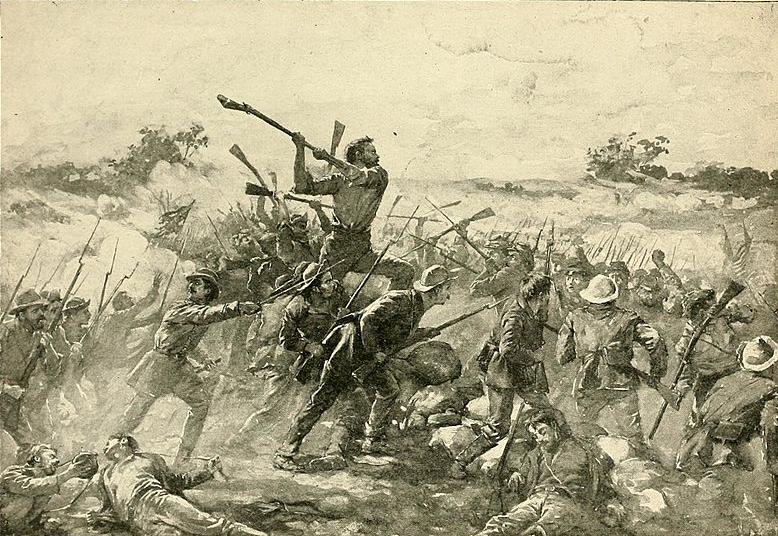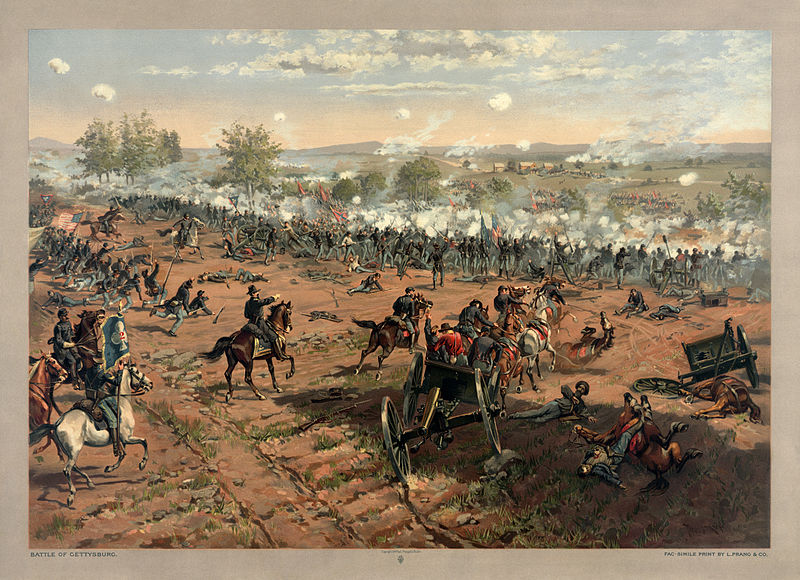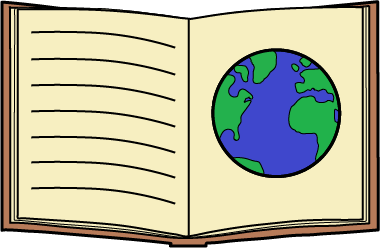Civil War
Battle of Gettysburg

The Battle of Gettysburg was the largest battle of the Civil War. More than 170,000 soldiers fought in it, and 51,000 were killed or injured. General Robert E. Lee wanted to attack the North on their soil. He hoped to defeat the Union with this advance. He thought this move into the north would help the South win the war.

In the middle of June 1863 General Lee took his troops and headed for Pennsylvania. General Mead, the head of Union forces, went after Lee's army. Lee had 70,000 troops. Mead had 95,000. When Lee heard that Meade’s army was coming he called for his armies who were nearby to meet at Gettysburg.
One of Lee’s generals, A. P. Hill, heard a rumor that there was a large supply of shoes in Gettysburg. Hill sent one of his divisions to get the shoes. On their way there they ran into the Union cavalry. Battle lines formed, and then fighting began. Backup forces for both sides came and got in the battle.
The next day, General Lee tried to break through the Union lines. He wanted to get them to retreat. He could not get that to happen. On the third day of battle Lee made a major push into the center of the line. He could not break through and lost many soldiers. Lee could not get this victory and lost a third of his troops.
The Battle of Gettysburg lasted for three days. General Lee ended up retreating to Virginia. Even though the war went on for two more years, Lee was never able to attack on northern territory again.
On November 19 of that same year the Union dedicated Soldier's National Cemetery. This was done where the Battle of Gettysburg took place four and a half months earlier. They did it to make a special place to honor the Union soldiers that were killed there. President Abraham Lincoln was asked to speak at the dedication. He gave what we now know as the Gettysburg Address. Read what Lincoln said. What do you think he meant in his speech?
Gettysburg Address

Four score and seven years ago our fathers brought forth on this continent, a new nation, conceived in Liberty, and dedicated to the proposition that all men are created equal.
Now we are engaged in a great civil war, testing whether that nation, or any nation so conceived and so dedicated, can long endure. We are met on a great battle-field of that war. We have come to dedicate a portion of that field, as a final resting place for those who here gave their lives that that nation might live. It is altogether fitting and proper that we should do this.
But, in a larger sense, we cannot dedicate -- we cannot consecrate -- we cannot hallow -- this ground. The brave men, living and dead, who struggled here, have consecrated it, far above our poor power to add or detract. The world will little note, nor long remember what we say here, but it can never forget what they did here. It is for us the living,
 rather, to be dedicated here to the unfinished work which they who fought here have thus far so nobly advanced. It is rather for us to be here dedicated to the great task remaining before us -- that from these honored dead we take increased devotion to that cause for which they gave the last full measure of devotion -- that we here highly resolve that these dead shall not have died in vain -- that this nation, under God, shall have a new birth of freedom -- and that government of the people, by the people, for the people, shall not perish from the earth.
rather, to be dedicated here to the unfinished work which they who fought here have thus far so nobly advanced. It is rather for us to be here dedicated to the great task remaining before us -- that from these honored dead we take increased devotion to that cause for which they gave the last full measure of devotion -- that we here highly resolve that these dead shall not have died in vain -- that this nation, under God, shall have a new birth of freedom -- and that government of the people, by the people, for the people, shall not perish from the earth.
Abraham Lincoln
November 19, 1863

Reading resources
© Reading-SocialStudiesSolutions
Text Credits:
https://www.nps.gov/gett/index.htm;
http://www.ushistory.org/us/33g.asp;
http://www.abrahamlincolnonline.org/lincoln/speeches/gettysburg.htm;
https://www.ourdocuments.gov/doc_large_image.php?flash=false&doc=36;
Image Credits:
“Battle of Gettysburg” by Thure de Thulstrup - L Prang and Co- Restoration by Adam Cuerden 0.5 at 800 px- Wikimedia Commons;
“Pickett’s Charge” from General Robert E. Lee - Soldier Citizen and Christian Patriot 1897 14784066315 by R A Brock- Wikimedia Commons;
Abraham Lincoln -Nov8-1863-portrait by Library of Congress portrait division- Wikimedia Commons;
Confederate soldier by Studio Haydes-300px- Openclipart.org
Abraham Lincoln -Nov8-1863-portrait by Library of Congress portrait division- Wikimedia Commons;
Confederate soldier by Studio Haydes-300px- Openclipart.org
Notes:
 rather, to be dedicated here to the unfinished work which they who fought here have thus far so nobly advanced. It is rather for us to be here dedicated to the great task remaining before us -- that from these honored dead we take increased devotion to that cause for which they gave the last full measure of devotion -- that we here highly resolve that these dead shall not have died in vain -- that this nation, under God, shall have a new birth of freedom -- and that government of the people, by the people, for the people, shall not perish from the earth.
rather, to be dedicated here to the unfinished work which they who fought here have thus far so nobly advanced. It is rather for us to be here dedicated to the great task remaining before us -- that from these honored dead we take increased devotion to that cause for which they gave the last full measure of devotion -- that we here highly resolve that these dead shall not have died in vain -- that this nation, under God, shall have a new birth of freedom -- and that government of the people, by the people, for the people, shall not perish from the earth. 


